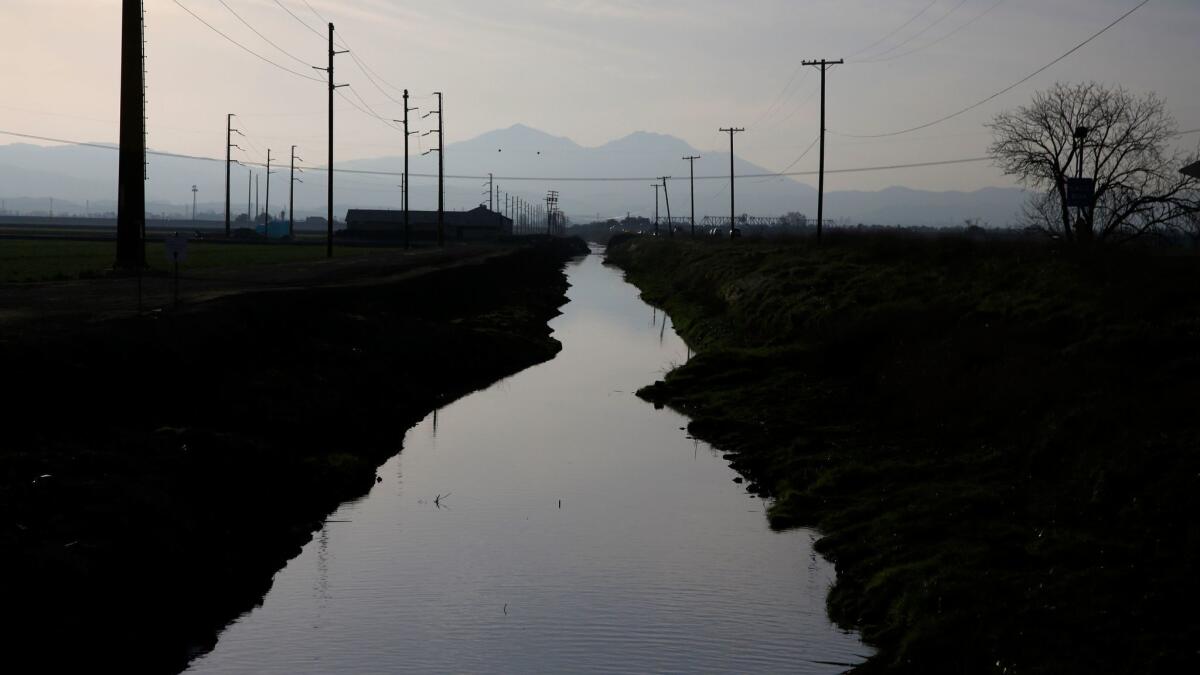A nearly $17-billion water project is being planned for California. What will it cost the Southland?

- Share via
After years of planning for one of the biggest California water projects in decades, a key question remains unanswered: Who exactly will pay for it?
Decision time is approaching for the agencies that will have to pick up the nearly $17-billion tab for building two massive water tunnels under the Sacramento-San Joaquin Delta, the heart of the state’s water works.
Whether the board of the Metropolitan Water District of Southern California commits to paying roughly a quarter of the bill could make or break the project.
Metropolitan management has been a consistent cheerleader for the tunnels, arguing they are vital to stabilizing deliveries of Northern California water that on average provide the Southland with about a third of its supplies.
“The costs of California WaterFix are substantial,” the staff wrote in a report reviewed Monday by two MWD committees. “However…the costs that would be allocated to Metropolitan are reasonable and affordable, given the water supply reliability improvements.”
The staff estimated that the project would cost MWD about $4.3 billion, increasing residential water rates an average of roughly $23 to $38 a year — depending on interest rates on the project debt.
Committee members appeared generally receptive to the presentation. But several indicated they wanted more time before the final project vote, which is scheduled for Sept. 26.
“The 26th is not realistic,” said board vice chair John Murray Jr., who represents Los Angeles.
Public comments at the Monday meeting were divided.
Speakers representing business and labor endorsed the project, saying it was needed to maintain reliable water supplies for the state’s most populous region. Charley Wilson, executive director of the nonprofit Southern California Water Committee, called the staff’s white paper a “prudent, conservative and responsible financial plan.”
But opponents predicted that MWD would wind up paying far more than the staff estimate, and argued the money would be better spent developing local supplies. The staff analysis “understates the costs and risks” to MWD, said Doug Obegi, an attorney with the Natural Resources Defense Council, an environmental group that has been involved in numerous lawsuits over endangered species protections in the delta.
As outlined by the MWD staff, the largely urban customers of the State Water Project would pay 55% of its cost, or $9.2 billion. The largely agricultural customers of the federal Central Valley Project would pay for 45%, or $7.5 billion.
Obegi and others said that breakdown was unrealistic for a couple of reasons.
First, growers can’t afford to pay that much. And irrigation districts with senior water rights and wildlife refuges — which both receive water from the delta — would not have to share the tunnel costs.
The State Water Project could wind up paying for 65% to 75% of the tunnels, driving up MWD’s cost, according to critics.
By diverting water from the Sacramento River in the north delta and sending it through twin tunnels to the south delta pumps, proponents hope, the project will diminish environmental impacts that have restricted water exports.
State water managers say the tunnels will not significantly boost average delta exports. Rather, they argue, the project will avert future restrictions that could slash delta deliveries to 1970s levels.
According to the MWD paper, if the tunnels are built, future delta supplies would be 1.3 million acre-feet greater than without the tunnels. The staff used that number to estimate the per-acre-foot cost of the tunnel water, concluding it would be far cheaper than new supplies from recycling projects or seawater desalination.
(An acre-foot is enough to supply two average households for a year.)
But in a recent blog post, Jeff Michael, a tunnel critic and director of the Business Forecasting Center at the University of the Pacific in Stockton, called MWD’s supply projections “wildly optimistic.” He said the board should demand more plausible cost comparisons with other water sources.
At Monday’s committee meeting, MWD general manager Jeffrey Kightlinger said that regardless of how the tunnel water supply is calculated, MWD’s project costs would stay the same.
Other water agencies are expected to vote soon on whether to participate in the tunnel project. If too many say no, the project could die — or the agencies that say yes would have to up their stake to keep it alive.
Twitter: @boxall
More to Read
Sign up for Essential California
The most important California stories and recommendations in your inbox every morning.
You may occasionally receive promotional content from the Los Angeles Times.











